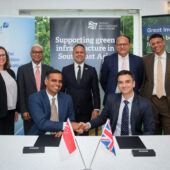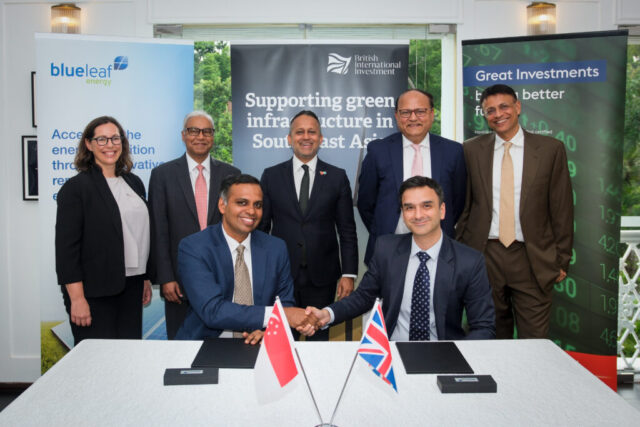The Dutch government-backed fund is providing valuable support for SMEs in developing countries at a time when sources of investment are drying up, report shows

SMEs run by a new wave of entrepreneurs are the lifeblood of many developing world economies, but they are struggling for funding at a time when many international investors, faced with a volatile global economic outlook, steer clear of the riskier end of the market. That makes the role of less risk-averse, government-backed funds increasingly important in maintaining funding flows
A new report from the Dutch Good Growth Fund (DGGF), which is financed by the Dutch Ministry of Foreign Affairs to invest in funds that support SMEs, highlights how it has been able to support innovative startups, especially in the tech sector, despite the impact of the COVID pandemic, rising prices and flatlining economies.
Clemens Gerteiser, director of fund investments at Amsterdam-based Triple Jump, which manages DGGF with PwC on behalf of the government, told Impact Investor how a willingness to back relatively high-risk investments has reaped dividends.

“Globally we are living in very challenging, volatile times. DGGF has needed to adapt both its strategy and impact objectives. But, at the same time, the role of an instrument such as DGGF has become even more important, because in times of trouble many investors are now shying away from taking risks,’’ he said.
DGGF, created in 2014, has a brief to focus particularly on underserved female and youth entrepreneurs, and job creation. More recently it has also added a green growth theme to address the issues of climate change impacts, and one focused on enabling SMEs to ‘build back better’ after the COVID pandemic.
“We look at the urgent need for DGGF and other like-minded funds to invest in the SMEs of the missing middle,” says Gerteiser. “Sometimes DGGF steps in as a cornerstone investor in first-time funds, and then works with other DFIs that may be investing together with DGGF to bring in private investors. And because we’re a dedicated government fund, we can usually take a bit more risk, especially when it comes to fragile countries and first-time managers.”
Besides its portfolio investments, the fund also catalyses investment via a seed capital programme, and by providing technical assistance for capacity building, training and market studies for managers at the funds in which it invests, as well as support for their portfolio companies.
As of December 2021, the main fund size was €350m, and the seed capital and business development facility stood at €40m, covering investments in 53 countries via 72 financial intermediaries.
In its Impact Report 2021, published in December 2022, DGGF estimates that it has helped finance 11,300 SMEs in frontier markets, 9.000 of which received support via its investment portfolio. Sub-Saharan Africa has accounted for the largest share of investments by region over the life of the fund.
Tech SMEs to the fore
DGGF says a focus on pioneering technology has paid off during the pandemic, reflected in strong performances from some SMEs supported by portfolio funds. In particular, health-related companies have proved to be well placed to grow.
In Vietnam, pharmacy retail chain Trung Son Care, a portfolio company of Asia Business Builders 1 (ABB1), was able to rapidly bolster its online business and home delivery service putting it in prime position to cater for changing customer purchasing habits. DGGF invested in ABB1 in 2018.
In Africa, DGGF supported Novastar Ventures Africa II, which invested in mPharma, a Ghanaian startup which helps pharmacies manage supply of prescription drugs, allows patients to identify pharmacies with the drugs they need and provides a price protection plan to ensure they can afford them.
DGGF’s focus on gender lens investing is reflected in a rise in the number of SMEs backed by funds it supports that are owned or led by women. These accounted for around 30% of the total number in 2021, compared to 23% in 2015.
Incubation successes
“We are especially proud of the funds we provided with seed capital, which in some cases grew enough to move on to their second, larger fund, and graduated into our main investment portfolio,” Gerteiser said.
One success story is Ramallah-based Ibtikar, a venture capital firm that invests in innovative companies founded by entrepreneurs in, or with links to, the Palestinian Territories. Having helped Ibtikar to get off the ground, DGGF is now investing around $6m-$7m in the Ibtikar Fund II, which achieved a first close of $15m. The overall target of $30m is some three times larger than Ibtikar’s inaugural fund. The second fund is investing in equity and convertible debt securities up to around $2m per investment with a focus on early stage start-ups in software, media, logistics, health and wellness, lifestyle, e-commerce, and property technology.
Another is Indian fund Ankur Capital, which launched its $50m Ankur Capital Fund II (ACF II), in January 2020. ACF II is a women-led initiative investing in early-stage tech solutions for low-income communities. DGGF had previously supported the founders’ pilot fund through its Seed Capital and Business Development facility, helping Ankur to ensure its activities were in line with international ESG standards. DGGF invested in ACF II alongside other investors, including British International Investment (BII) and the state-run Small Industries Development Bank of India (SIDBI).
DGGF says in the report that its impact data reflects the challenges faced by investors but also how it is still possible to make a difference: “While, for example, job growth has slowed, our deliberate decision to invest in pioneering technology paid off during the pandemic as we were also part of the drive to innovation. All in all, we have been able to grow our absolute numbers despite the unprecedented situation.”





